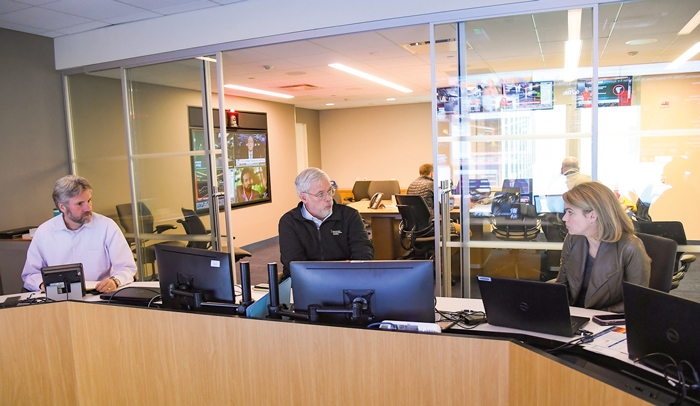Photo Courtesy of Marc Hermann/MTA New York City Transit
MTA Chairman and CEO Pat Foye (c.) recently convened a meeting in the situation room to discuss the agency’s ongoing response to the coronavirus with Chief Operating Officer Mario Péloquin and NYCT Interim President Sarah Feinberg.
By Michael V. Cusenza
The Metropolitan Transportation Authority recently sent a letter to the New York Congressional Delegation urgently requesting more than $4 billion in federal aid as the agency continues to respond to the coronavirus pandemic.
“[T]he stark reality is that as more people stay home following the advice of medical experts, the MTA is now facing financial calamity,” MTA Chairman and CEO Pat Foye wrote.
According to Foye, the MTA continues “to operate our subways, railroads, buses, and Access-A-Ride services around the clock, helping to get essential employees—medical professionals, childcare workers, first responders, public utility employees, our transportation workers—where they need to be. We’ve substantially increased the intensity and frequency of cleaning protocols across the system, disinfecting all stations and touchpoints twice a day. Our entire fleet of subways, buses and rail cars is disinfected on a 72-hour cycle – except for Access-A-Ride vehicles serving the disabled, which are sanitized daily. Whatever the cost, the MTA’s first priority is protecting the health of our customers as well as the brave MTA employees who continue to show up for work—as they have done after past emergencies like 9/11 and Superstorm Sandy.”
However, ridership has fallen approximately 60 percent on the subways, 49 percent on buses, 90 percent on Metro-North and 67 percent on Long Island Rail Road, Foye noted.
“As a result, MTA revenue has plummeted as we provide these essential services. We project the full impact will be over $4 billion by the end of 2020—even without accounting for the expected collapse of the more than $6 billion in State and local taxes dedicated to the MTA,” Foye added.
For those reasons, the agency is requesting federal aid at the level of MTA revenue losses ($3.7 billion assuming recent ridership trends continue for six months) and coronavirus expenses (approximately $300 million annualized).
In other public transportation news, MTA New York City Transit, Transport Workers Union and Amalgamated Transit Union announced a new rear-door boarding policy on all buses, beginning on Monday, March 23.
Customers will board and exit all local and Select Bus Service buses using the rear doors. Express bus customers will board as normal, but will not be permitted to sit in the first three rows of the bus to ensure customers are a safe social distance from bus operators. ADA customers will still be permitted to board at the front of all local and SBS buses, and board as usual on express buses. Regular fare policy remains in effect wherever on-board payment boxes or SBS off-board ticket machines continue to be accessible.
“While Gov. Cuomo has ordered non-essential workers beginning Sunday night to remain in their homes and not take mass transit, we are taking aggressive action to protect our thousands of frontline employees who are delivering a critical service to New York, moving the healthcare workers, first responders, utility workers, and essential employees who are protecting us from this public health crisis,” Foye said Friday. “Transit workers are the lifeblood of this city and region and we are going to do everything we can to protect their health and safety.”

